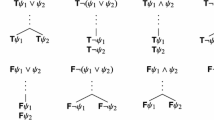Abstract
Logical guarantees of validity must be understood as subject to the proviso that no equivocation is committed. But we do not have a formal theory of equivocation. This paper attempts to formulate rules for responding to equivocal arguments in the context of dialogue. What occurs when one distinguishes meanings of an equivocal expression turns out to be rather different from definition.
Similar content being viewed by others
References
Aristotle. An. Post.: Posterior Analytics (trans. G. R. G. Mure). In Works, Vol. 1, (ed. W. D. Ross) (London; Oxford University Press, 1928, repr. 1968).
Aristotle. Soph.El.: Sophistical Refutations (trans. W. A. Pickard-Cambridge).In Works (cited above), vol.1.
Aristotle. Top.: Topics(trans. W. A. Pickard-Cambridge). In Works (cited above), vol. 1.
Cormack, Annabel, and Ruth M. Kempson: 1981, ‘On Formal Games and Forms of Games’. Linguistics and Philosophy 4, 431–435.
Diogenes, Laertius. Vitae: Lives of Eminent Philosophers (with trans. by R. D. Hicks). London; William Heinemann, 1925. References by book and paragraph.
Dummett, Michael: 1973, Frege: Philosophy of Language. London; Duckworth.
Frege, Gottlob: 1879, Begriffsschrift. Repr. Hildesheim; Georg Olms, 1964.
Frege, Gottlob: 1903, Grundgesetze der Arithmetik (2 vols. in one). Repr. Hildesheim; Georg Olms, 1962.
Gil, David: 1982, ‘Quantifier Scope, Linguistic Variation, and Natural Language Semantics’. Linguistics and Philosophy 5, 419–472.
Hamblin, Charles L.: 1970, Fallacies, Methuen, London.
Hamblin, Charles L.: 1973, ‘A Felicitous Fragment of the Predicate Calculus’, Notre Dame Journal of Formal Logic 14, 433–447.
Kempson, Ruth M., and Annabel Cormack: 1981, ‘Ambiguity and Quantification’, Linguistics and Philosophy 4, 259–309.
Kripke, Saul: 1972, ‘Naming and Necessity’, in Donald Davidson and Gilbert Harman (eds.), Semantics of Natural Language, D. Reidel, Dordrecht, pp. 253–355.
Lewis, David: 1979, ‘Scorekeeping in a Language Game’, Journal of Philosophical Logic 8, 339–359.
Lewis, David: 1982, ‘Logic for Equivocators’, Noûs 16, 431–441.
Mackenzie, Jim: 1979, ‘How to Stop Talking to Tortoises’, Notre Dame Journal of Formal Logic 20, 705–717.
Mackenzie, Jim: 1984, ‘Begging the Question in Dialogue’, Australasian Journal of Philosophy 62, 174–181.
Melone, S. H.: 1914, An Introductory Text Book of Logic (7th ed.), Blackwood, Edinburgh.
Quine, W. V.: 1951, ‘Two Dogmas of Empiricism’, in his From a Logical Point of View (2nd ed.rev.), Harper & Row 1961, N. Y., pp. 20–46.
Routley [now Sylvan], Richard: 1980, Exploring Meinong's Jungle and Beyond Australian National University, Canberra.
Russell, Betrand: 1969, Autobiography, London; George Allen & Unwin.
Sextus Empiricus. Pyrr. Hyp.: Outlines of Pyrronism (with a trans. by R. G. Bury). London; William Heinemann, 1933.
Tennant, Neil: 1981, ‘Formal Games and Forms of Games’, Linguistics and Philosophy 4, 311–320.
Whately, Richard: 1859, Elements of Logic (9th ed.), John W. Parker & Son, London.
Author information
Authors and Affiliations
Rights and permissions
About this article
Cite this article
Mackenzie, J. Distinguo: The response to equivocation. Argumentation 2, 465–482 (1988). https://doi.org/10.1007/BF00128987
Issue Date:
DOI: https://doi.org/10.1007/BF00128987




